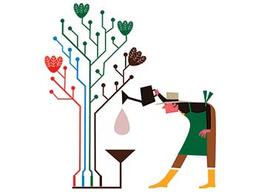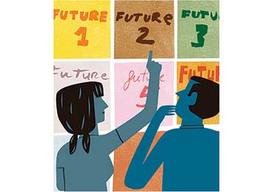
As a child, Ruha Benjamin was always adapting to new surroundings. Born in India to an Iranian mother and an African American father, she moved with her family a lot — first to California, then South Carolina, the South Pacific, and South Africa. “I didn’t feel out of place, but I didn’t feel in place, either,” she says. It’s perhaps why Benjamin is consistently examining societies and institutions with fresh eyes, never taking any aspect of them for granted.
Today, the professor of African American studies applies her research and analytical skills to exposing the powerful social and political forces that influence science, technology, and medicine — “areas of inquiry that go unquestioned because we think of them as objective, as neutral, as asocial,” she says. “And that is even more reason to study them. Humans are behind them. It’s like pulling the curtain back to see the Wizard of Oz behind all of this.”
Benjamin’s Studies: A Sampling

UNFAIR ADVANCEMENTS
Imagine that you are a woman donating your eggs only to discover that there is no post-op care provided. Or trying to rest on a park bench, only to be poked with small spikes that require payment to retract. In a 2015 TEDx talk, Benjamin discussed the often-unrecognized impact that our social and political mores have on scientific and technological advancements. “I wanted us to think about how we live every day with invisible ‘spikes’ in our various institutions and how so much of our social lives is ‘metered,’” Benjamin says. “Innovation and inequity too often go hand in hand, but they don’t have to if we become more deliberate and conscious about what values and politics we’re building into [the design] — whether it’s a bench or education or health care.”

HUMAN SIDE OF TECH
We often talk about the impact of technology on our society while overlooking the fact that our society is what’s creating that technology, says Benjamin in her forthcoming book, Race After Technology. “Rather than thinking about this device falling from a tree like a fruit, which then has an impact on us, let’s think about what seeds were planted in the first place to grow this particular technology,” she says. “When we just assume that we are the recipients of science and technology rather than the protagonists, we give up our power … to shape the world we’re living in.”

IMAGINED FUTURES
A longtime sci-fi fan, Benjamin has focused on how speculation about the future might produce insights into the world we live in now. “Speculation allows us to question the inevitability of the present,” she says. “It’s not the only present that could have been. There were choices made to get us to this present, which means we can make choices to get us to different kinds of futures.” Through her own fictional narratives, such as “Ferguson Is the Future,” Benjamin relies on “speculation [as] a method of … giving voice to our own agency to shape the future.”
READ MORE: Recent books by Ruha Benjamin
Captivating Technology: Race, Carceral Technoscience, and Liberatory Imagination in Everyday Life
Race After Technology: Abolitionist Tools for the New Jim Code











No responses yet